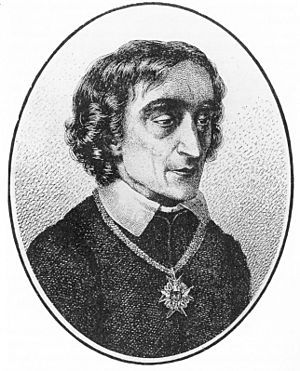Zacharias Werner facts for kids
Friedrich Ludwig Zacharias Werner (born November 18, 1768 – died January 17, 1823) was a German poet, a writer of plays (called a dramatist), and a preacher. As a playwright, he became famous for starting a new style of plays known as "tragedies of fate." These plays often showed characters whose lives seemed controlled by destiny.
Life Story
Werner was born in a city called Königsberg in East Prussia. He went to the University of Königsberg where he studied law. He also listened to lectures by the famous philosopher Immanuel Kant. Ideas from Jean-Jacques Rousseau and his followers also greatly influenced Werner's way of thinking.
Werner had a challenging personal life and was married several times. However, people soon recognized his talent. In 1793, he started working for the Prussian government in Warsaw. Later, in 1805, he got a government job in Berlin. But just two years later, he left his job to travel.
During his travels, Werner met many important writers of his time. He met Goethe in Weimar and Madame de Staël in Coppet. While in Rome, he joined the Roman Catholic Church in 1811. He became a priest in 1814 in Aschaffenburg. After this, he stopped writing plays as much and became a very popular preacher in Vienna. Many people came to hear his sermons, especially during a big meeting in 1814. He was later made the head of the cathedral in Kaminiec.
Werner passed away in Vienna.
His Writings
Werner's plays were often performed on stage and were very successful. For example, the famous opera Attila by Verdi is based on Werner's play of the same name.
One of his most famous plays was Der 24. Februar. He named it this because his mother and a close friend both died on February 24th. This play helped start the era of "tragedies of fate" in German theater. Some of his plays also aimed to share ideas about freemasonry.
Here are some of his well-known works:
- Vermischte Gedichte, 1789
- Die Söhne des Thals, 1803-1804 (in two parts)
- Die Templer auf Cypern, 1803
- Die Kreuzesbrüder, 1804
- Das Kreuz an der Ostsee, 1806
- Die Brautnacht, 1806
- Martin Luther oder die Weihe der Kraft, 1806
- Der vierundzwanzigste Februar, 1808
- Attila, König der Hunnen, romantische Tragödie, 1809
- Wanda, 1810
- Die Weihe der Unkraft, 1813 (a play that changed his earlier ideas from Martin Luther)
- Kunigunde die Heilige, 1815
- Geistliche Übungen für drei Tage, 1818
- Die Mutter der Makkabäer, 1820
See also
 In Spanish: Zacharias Werner para niños
In Spanish: Zacharias Werner para niños
 | Charles R. Drew |
 | Benjamin Banneker |
 | Jane C. Wright |
 | Roger Arliner Young |


